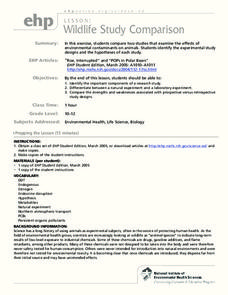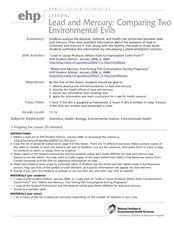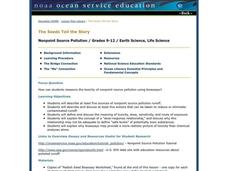Curated OER
Activities for a High School Instrumentation Course
The intent of this series of activities is to introduce high schoolers to the field of chemical instrumentaiton. They perform a few basic chemistry lab techniques: pH titration, paper, gas, and liquid chromatography, ultraviolet and...
Curated OER
Wildlife Study Comparison
Environmental science classes read articles about two different scientific studies. One is about the effects of contraceptive chemicals on fertility, and the other is about how a pesticide may be reducing bone density in exposed...
Beyond Benign
SLS Toxicology Test
Ingredients in your shampoo are toxic enough to kill plants. The 16th installment of the series of 24 tests the toxicity level of various concentrations of SLS, a chemical found in nearly all shampoo. Learners prepare percent solutions...
LABScI
Photosynthesis: How Do Plants Get Energy?
Examine the mechanism of photosynthesis through different light scenarios. Pupils vary the amount and type of light exposure on plant leaves in the fifth lesson plan in a 12-part series. Through observation, they determine the rate of...
Nuffield Foundation
Investigating the Effect of Concentration of Blackcurrant Squash on Osmosis in Chipped Potatoes
Model and explore osmosis using squash and potatoes. Young scientists expose chunks of potatoes to different concentrations of a squash solution. They compare the weights of the chunks before and after exposure to the solution and use...
Curated OER
Fuel Mystery Dis-Solved
Learners describe how temperature and surface area exposure affect the rate at which fuel is consumed. They explain why engineers want to know about the properties of a fuel when designing rockets. They create a bar graph of result data.
Curated OER
Matter and Chemical Bonding
In this chemical bonding worksheet, high schoolers read about the invisible killer, dihydrogen monoxide. Students read about the products it is used in and the problems it causes to the environment. Then high schoolers complete 19 short...
Curated OER
A Yen for Maximum Residue Limits in Food
Future public health officials or agriculturists read an article and answer questions concerning the Japanese regulations for pesticide exposure. They compare the maximum residue limit for two, 4-D of Japan with other countries. This is...
Curated OER
Lead and Mercury: Comparing Two Environmental Evils
High schoolers in chemistry or health courses look at the material safety data sheet (MSDS) and periodic table of elements to gather information about mercury and lead, two toxic materials that have been found in food products. They read...
Curated OER
Environmental Hazards
Students identify environmental hazards on a simulated field trip. They analyze the exposure and suggest methods to eliminate or reduce exposure to toxic sources.
Curated OER
Dose-Response Relationship
Students complete their observations of germinating seeds. They create a graph showing all of their data and develop a dose-response curve. They compare their data with other groups and analyze the curves.
Curated OER
Toxicology 2: Finding the Toxic Dose
Young scholars brainstorm with group partners to decide upon a chemical they would like to test, and outline a procedure for their investigation. They then present in groups their ideas to the rest of the class as well as the chemical...
Curated OER
How Hazardous Substances Affect People
Students examine the health effects of hazardous waste on people. They work together to complete an experiment in which worms are exposed to chemicals. They discuss the results of the test.
Curated OER
Smoke Gets In Your Eyes, Your Nose, Your Mouth, Your Lungs...
Young scholars discover and discuss the effects smoking has on the body. They also discuss secondhand smoke and formulate an opinion about smoking in public places. They monitor their own exposure to secondhand smoke and create a...
Curated OER
UV Beads
Students recognize preventitive measures that can be taken to reduce the risks associated with exposure to solar radiation. They explain why solar radiation can be harmful. They utilize beads that turn color when exposed to UV rays. Good...
Curated OER
Combating Corrosion
Students perform an experiment to show the chemical reactions that occur when metal corrodes. They apply the results of the experiment to the conservation efforts of art curators trying to restore an ancient Greek bronze. This lesson...
Curated OER
Secondhand Smoke
In this health science worksheet, students complete 8 short answer questions after reading information on the "Health Effects of Exposure to Secondhand Smoke."
Curated OER
The Portion is the Poison
Students calculate the amount of everyday food products or liquids that would need to be consumed in order to become toxic. By using unit analysis, they calculate the amount of certain common food items that would need to be consumed in...
Curated OER
Is Dry Cleaning Dangerous?
In this dry cleaning activity, students read about the chemicals used to clean clothes and the alternative possibilities for dry cleaning use. Students answer three critical thinking questions about the dangers of the chemical agents...
Curated OER
Toxicology and Living Systems
Pupils investigate how toxic chemicals affect biological systems. They determine the toxic dose of a chemical that inhibits seed germination in a Brassica rapa. They investigate the effect of environmental tobacco smoke on human lung...
Curated OER
Chernobyl
Students list some of the health effects of radiation exposure. They are engaged in a unit on nuclear power by demonstrating the potential environmental health risks involved.
Curated OER
Soil Morphology
Students analyze images of five different soil types from various locations and discuss how climate, vegetation, parent material, topography, and time can contribute to soil characteristics.
Curated OER
The Seeds Tell the Story
High schoolers explore sources of pollution runoff and actions that can be taken to reduce runoff. In this pollution lesson students complete a worksheet and see why bio-essays may provide a more realistic picture of toxicity.
Curated OER
Combating Corrosion
Study corrosion on bronze statues with a hands-on activity. As pupils place a penny in water with salt, they observe the changes in the penny throughout a period of a week. They then analyze the pre-conservation and the...























